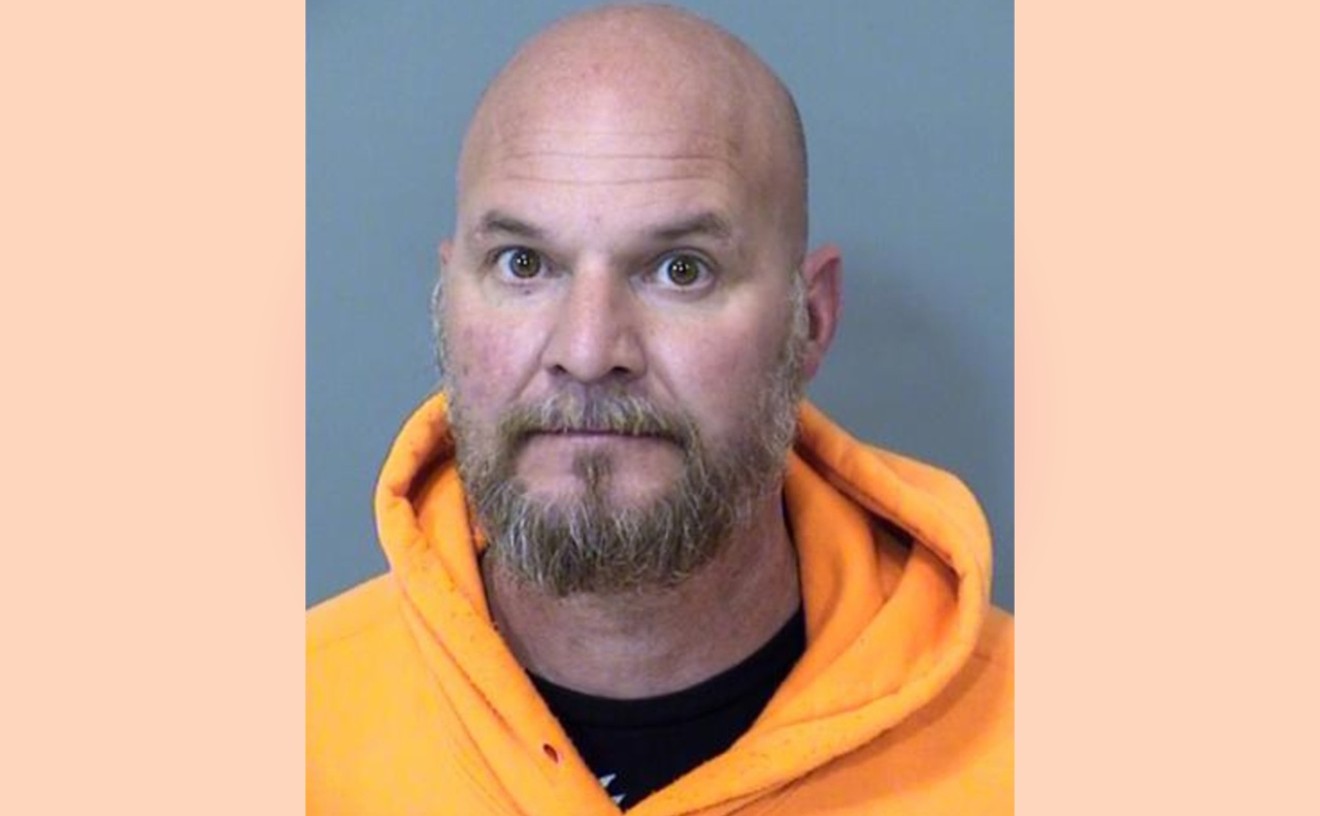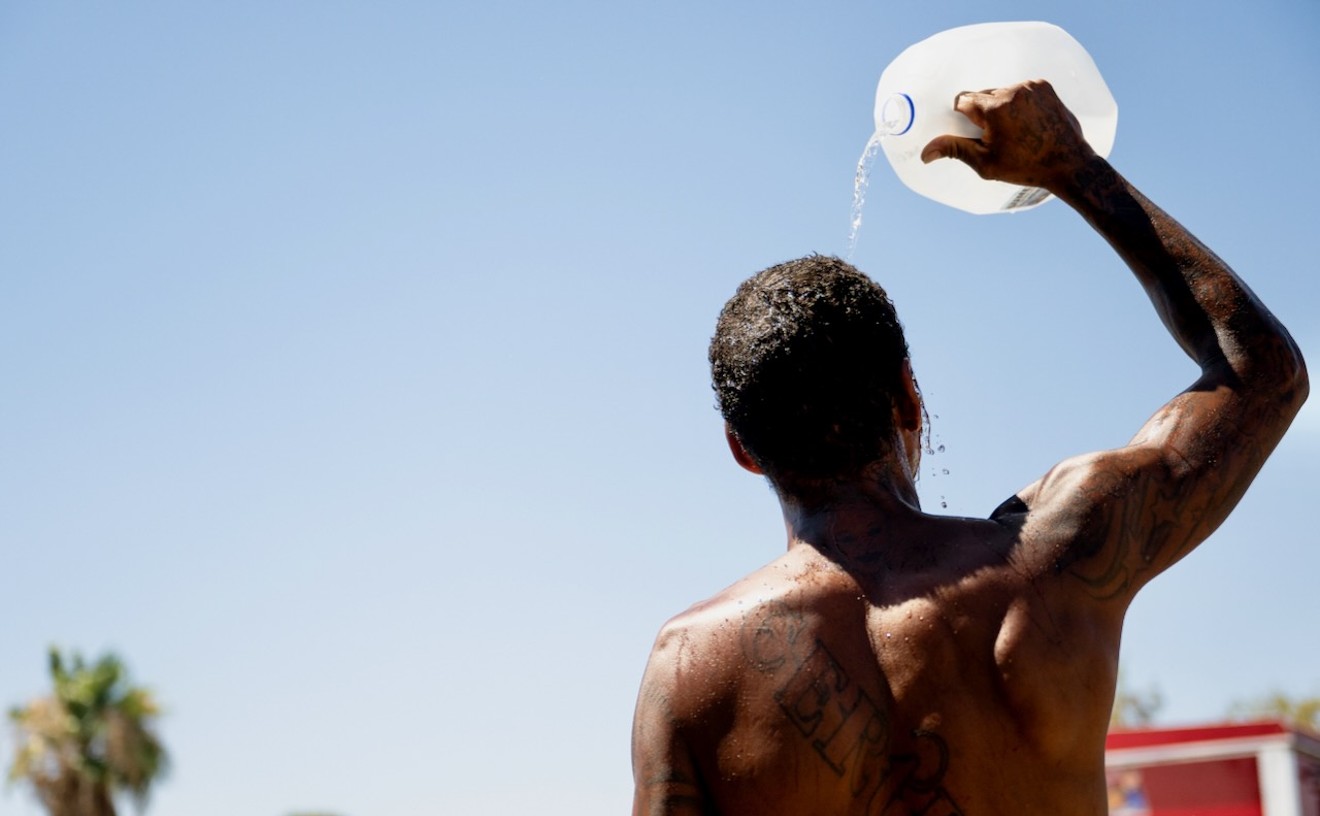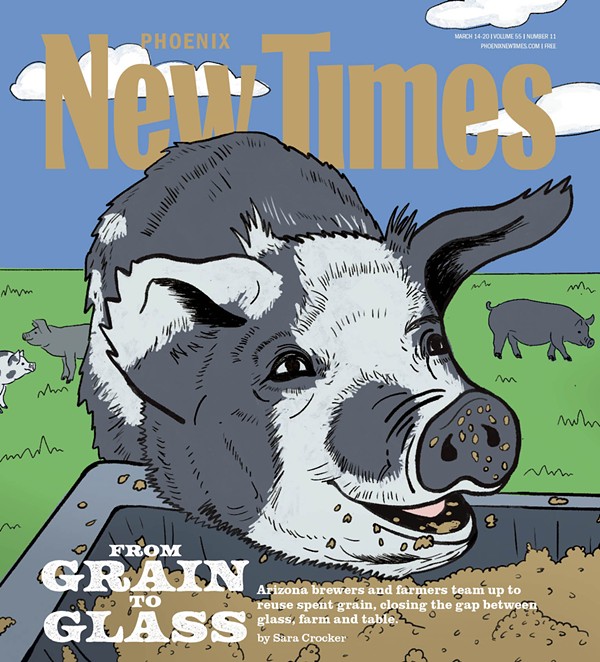On August 16, 1986, Eric Kane, 16, was found murdered in a room at the University Inn in Flagstaff. He had been brutally stabbed to death. Six days later, Jacob Wideman, also 16, who had shared the room with Kane and then fled the scene, surrendered to police in the company of his father and the well-known Phoenix criminal attorney Mike Kimerer.
The first thing Kimerer did was get a court order prohibiting Flagstaff police from attempting to question his client unless the lawyer were present. This was a heavy-heat case in which extraordinary measures were being taken to protect the accused. All stops were being pulled out to protect him from self-incrimination.
The case became more celebrated back East than it was here in Arizona. Young Wideman, you see, was the son of the critically acclaimed black novelist John Edgar Wideman, who has twice been awarded the PEN/Faulkner Award for literature.
But both boys had grown up in fortunate circumstances.
Kane, the victim, was the son of a vice president of IBM, and was raised on Long Island. His scholastic records showed he was an outstanding student and possibly the most popular member of his class.
Jacob Wideman never did stand trial. He entered a guilty plea and accepted a life sentence.
His father's articles decrying racism appear in such magazines as Esquire, Harper's and McCall's. Recently, he wrote about the causes of the Los Angeles riots.
The elder Wideman has achieved much. He was the second black American in 50 years to receive a Rhodes scholarship. He remained in England three years, studying 18th-century literature. Before that, Wideman had been a Phi Beta Kappa student and captain of the basketball team at the University of Pennsylvania.
Wideman's best-known book to date is Brothers and Keepers. It is a nonfiction account of growing up in the black ghetto of Homewood in Pittsburgh. The focus of the story is Wideman's younger brother, Robby, who didn't make it to college. Instead, he became a drug dealer who was given a sentence of life imprisonment after being involved in a felony murder.
Jonathan Yardley of the Washington Post called Brothers and Keepers "powerful and disturbing . . . guaranteed to shock and sadden."
The Denver Post said: "If you care at all about brotherhood and dignity and other such things, this is a must-read book."
I never could figure out what the Denver Post meant by the phrase "and other such things."
In 1986, when Jacob Wideman murdered his roommate with a hunting knife that at least two witnesses later told Flagstaff police he had been compulsively sharpening for a week, the elder Wideman was teaching English at the University of Wyoming in Laramie.
Young Wideman and Kane, the two boys, met that summer at a boys' camp in New York state. They became friends. There was never any tension between them. They became part of a group of campers touring the Western states after the close of camp. They planned to visit the Grand Canyon the morning after their overnight stay in Flagstaff.
Why, you ask, did Jacob Wideman follow the path of his rogue uncle, Robby, and not that of his writer father? It is not that he had a problem with Jews. His mother's maiden name, in fact, is Judith Ann Goldman. As the product of a mixed marriage, Jacob appeared more white-skinned than black.
Then I thought I had found the answer. In looking through my August 1 copy of the New Yorker magazine, I noticed in the table of contents that John Edgar Wideman had written about his son's crime.
"Personal History," the piece was labeled. There was an additional explanation: "A father examines his family and its losses, six years after his son was convicted of murder and sentenced to life."
(Although the murder occurred in 1986, Jacob did not begin serving time in prison until 1988.)
Avidly, I plunged into Wideman's tale. At first, it was slow going. Wideman is one of those literary writers who confuses prolixity with profundity. He cannot tell a straight story. He must first impress you with the depth of his emotions. To him, everything is Moby-Dick.
But I dutifully forged ahead, believing this was my best shot at learning about the senseless Flagstaff crime. Certainly, I thought, an author of Wideman's talents should have some significant insights to offer by now.
Then, about halfway through the piece, I came to the following passage. The words appear to be addressed directly to his imprisoned son, Jacob, now 24 years old:
"I hope this is not a bad day for you," the father writes. "I hope you can muster peace within yourself and deal with the memories, the horrors of the past eight years . . .
"I remember a few days after hearing you were missing and a boy was found dead in the room the two of you had been sharing . . . I was a man who had most likely lost his son. . . ."
There is more about the ordeal of being the father of a son accused of murder:
"The eight years have not passed quickly. There are moments I conceal from myself as I've hidden them from other people. Other moments, also countless, when terrible things had to be shared, spoken aloud, in phone calls with lawyers, depositions, interviews, conferences, in the endless conversations with your mother."
You are confused? So am I. As you can see, these passages fall far short of being an explanation about what happened to Eric Kane, the victim, on the night of August 16, 1986. In the absence of any statement to the contrary, we are even left wondering whether the Wideman family feels any sense of remorse or sorrow for the victim.
Eric Kane is never mentioned by name; nor is there any description of his life or background. It is as though Eric Kane never existed. He was an object that suddenly appeared on the scene and ruined Jacob Wideman's life.
Finally, the piece closes with John Edgar Wideman looking back in a Faulknerian reverie to his ancestral slave roots in a small place he calls Promised Land, South Carolina: "a region, a country, and its practice of human bondage, its tradition of stealing, or distorting, black people's lives, begins to crowd out the possibility of seeing my ancestors as human beings."
Wideman concludes by charging that the history of slavery "still rises like a shadow, a wall between my grandfathers and me, my father and me, between the two of us, father and son, son and father."
Does Wideman mean what I think he means? Does he hold slavery responsible for both his brother's and son's convictions for murder and their subsequent life sentences?
I sit there, stunned. I read the passage, two times, three times, four times. I can't figure it out.
And then a thought strikes me. It pops into mind because author Wideman had also slighted the victim in his description in Brothers and Keepers--the man gunned down on November 15, 1975, by three men, including Wideman's brother, Robby. The tone of that tale, too, was a remarkable display of emotional control. Or should I call it what it actually appears to be, a display of insensitivity toward any victim whose name doesn't happen to be Wideman?
In the book, he quotes his brother's account of the event:
"I'm telling you the whole bit now. Ain't holding nothing back. That's the way we was. Stone gangsters. Robbing people. Waving guns in people's faces. Serious shit. But it was like playing, too. A game. A big game and we was just big kids having fun. Guns wasn't real. Bullets wasn't real. Wasn't planning on hurting nobody. Pow. Pow. You know. Fall over. I got you. No, you didn't. You missed. You lying. I got you first.
"I remember the scraggly hair and them hippie-type clothes but ain't nothing where his face supposed to be. I can hear that soft voice but I can't see no mouth, no face. . . . Last time I saw the dude he was holding his shoulder and hauling ass. Could have blowed him away easy. A real easy shot. I'm remembering how he looked and figuring couldn't be nothing wrong with a cat running as hard as he was. He was grabbing at his shoulder but he was steady truckin'.
"How's he dead, man? The cat was running, man."
@rule:
@body:I decided the only way I was ever going to find anything out about the murder in Flagstaff was to visit the courthouse up there and search through the criminal file.
The ancient courthouse is tiny by the Phoenix standard. The halls are narrow and the courtrooms small and cramped. The building is only two stories high. There is, of course, no elevator.
I learn right away that Eric Kane did, indeed, have a family. Wideman has never mentioned them in any of his writings. In fact, he never got to tell them he was sorry.
But their imprint is all over Jacob Wideman's criminal file.
The Kanes made not one, but two written statements for the court explaining their feelings about the case. The first was entered on November 22, 1986, and the second two years later, on September 28, 1988.
Here are some passages from the second statement:
"When Jacob Wideman brutally stabbed Eric while he slept, and left him to die, he took a loving son, a caring grandson and a close friend.
"The pain and emptiness is forever. The loss is forever. The pain is forever.
"Eric was killed by an animal. Eric was asleep. There was no provocation or ill will. Wideman simply needed to kill. In addition to murdering Eric, he has been charged with killing a young girl in Wyoming in 1985, and he attempted to kill a boy in Boston in October 1986. He has a violent history, including such acts as fighting, sexual molestation of his sister and stealing. Jacob Wideman deserves no place in society today or at any time. If justice were properly served in this case, he would be sentenced to death.
"We have no doubt that he will kill again. If he were to be released when first eligible for parole in 25 years, he will be only 41 years old and will have had plenty of time to work on his animal instincts and need to kill. The justice system must protect us against this animal."
In the file are records of interviews with principals in the case.
There is a fascinating interview with Jacob Wideman's high school basketball coach in Laramie, Wyoming.
The coach said that one of Jacob's problems seemed to be that the family revolved around his older brother, Danny, who was a star basketball player.
Jacob was also an outstanding player, but two years younger. When the coach moved Jacob up to the starting five for one game to replace Danny, the family's reaction was one of horror, because Danny had been sent to the bench. John Edgar Wideman, who never missed a game, went to the coach to complain.
The coach said that the elder Wideman was so interested in Danny's future as a basketball player that he had decided to take a teaching job at the University of Massachusetts the following year so the family could be close to Danny while he played basketball for Brown University.
They planned on leaving Jacob behind in Laramie to finish up his high school work.
In the file, there is a transcribed copy of Jacob's confession; it was read aloud at Jacob's sentencing in one of the tiny courtrooms in Flagstaff. Both sets of parents were present. They never spoke.
"I murdered Eric Kane," Jacob said. "It was not premeditated. It was the result of a lot of different emotions. I had just woken up. It was 1 a.m. I didn't know what I was doing. I wasn't thinking straight. I was restless. I put on my clothes and I saw the knife and I saw Eric and I picked up the knife and stabbed him two times.
"I've had a really tough year, and he was the target of a lot of my emotions.
"I'm very sorry for what I did. I should be given a chance to live and make something of my life. I don't want the death sentence applied."
Louise Kane, Eric's mother, spoke candidly that day:
"I'm sick of hearing about black and white. This is not a question of who's black and who's white, but of murder. The murder of my son, Eric."
Eric's brother, Randy, then 21, also spoke out:
"It's John Edgar Wideman's fault," he said. "He's got an attitude that sucks. I knew him at the camp. He always tried to get things his own way."
Eric's father spoke out, too:
"I read Brothers and Keepers," he said. "The man sounds like someone who uses the system to his advantage. But if it doesn't work out for him, he'll scream and holler about how unfair it is. I'm sure he can eventually bend the system to get his son Jacob out of prison."
Two years ago, John Edgar Wideman wrote a piece for Harper's describing a visit to his brother in prison. His brother has developed huge biceps from constant weightlifting to pass the time.
Robby Wideman has a whole new view of race relations:
"I think I'm finally beginning to understand why they so evil to us," Robby tells his older brother. "They're scared of the black man. Really scared. More scared than I ever knew. More scared than they know themselves."
Robby Wideman's latest request for parole has been denied. He has now been in prison for 18 years.
"None of it makes any goddamn sense," he says. "They don't have to give reasons for what they do. But one of the dudes they didn't deny was a white boy. He even escaped the joint, and now they granted him a hearing with the full parole board. What kind of sense do it make?"
So it goes.










